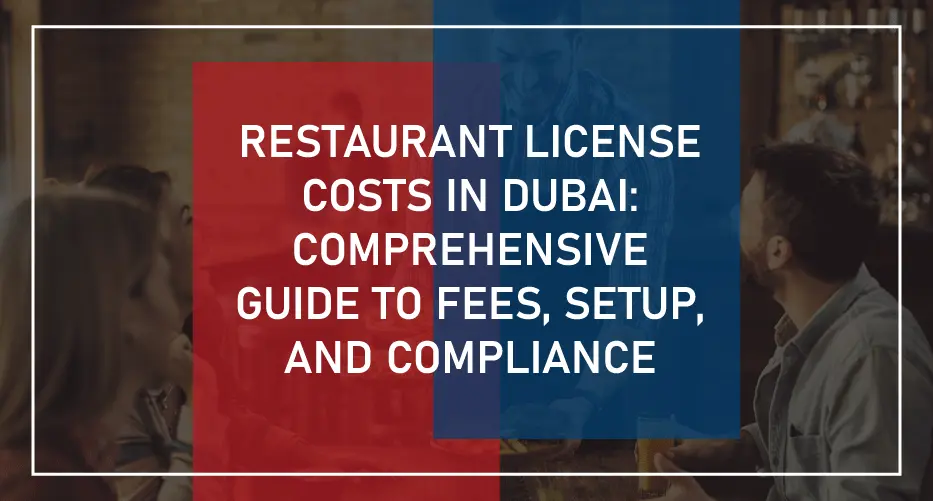Restaurant License Costs in Dubai

1. Introduction
Opening a restaurant in Dubai is an exciting and potentially lucrative venture, but understanding the costs involved is crucial for anyone looking to succeed in the city’s competitive food and beverage market. How much does it cost to get a restaurant license in Dubai? What additional fees should you anticipate beyond the license itself? These are questions many entrepreneurs face as they plan to tap into the growing dining culture in one of the world’s most dynamic cities.
In this article, we will break down the various expenses associated with obtaining a restaurant license in Dubai, from initial application fees to ongoing regulatory costs. We’ll also discuss the steps required to secure the proper permits, compliance regulations, and how working with a PRO service provider, such as Dahhan Business Services, can help simplify the process and reduce costs.
By the end of this guide, you’ll have a clear understanding of:
• The different types of restaurant licenses available in Dubai.
• A detailed breakdown of the costs involved.
• The process for obtaining a restaurant license.
• Why partnering with a professional service provider can save time and money.
Whether you’re an entrepreneur seeking to establish your first restaurant or an experienced restaurateur expanding into the Dubai market, this guide will provide the essential insights you need to navigate the regulatory landscape efficiently.
2. Overview of Restaurant License Costs in Dubai
Opening a restaurant in Dubai requires obtaining the correct licenses to operate legally. The costs associated with obtaining a restaurant license can vary based on the type of establishment, the location, and the specific services you plan to offer. The UAE government has implemented clear regulations and fees, making it essential to understand the financial aspects before diving into the food and beverage industry in this city.
What is a Restaurant License in Dubai?
A restaurant license is a legal permit required to operate any food and beverage outlet in Dubai. It ensures that your business complies with all safety, health, and regulatory standards set by local authorities such as the Dubai Municipality and the Department of Economic Development (DED). Without this license, your restaurant cannot legally serve food to customers, making it a critical step in establishing your business.
The primary purpose of the restaurant license is to certify that your establishment meets the strict health and safety standards that the city enforces to protect public health. Whether you’re planning a small café, a fast-food chain, or a fine-dining restaurant, obtaining the correct restaurant license is the first and most important step.
Why You Need a Restaurant License?
Aside from being a legal requirement, obtaining a restaurant license in Dubai comes with several benefits:
• Business Legitimacy: It signals to customers and suppliers that your establishment meets the necessary legal and health standards.
• Access to Resources: Licensed restaurants can easily procure supplies, partner with vendors, and build strong business relationships.
• Compliance with Health and Safety Standards: The license ensures that your restaurant operates under the safety regulations stipulated by Dubai authorities, helping to prevent legal complications and potential fines.
Understanding the Types of Restaurant Licenses in Dubai
Before applying for a restaurant license, it’s crucial to understand the different types available and which one is best suited for your business model. The two primary licenses needed are:
Commercial License
A commercial license is mandatory for businesses operating in the food and beverage sector. Issued by the Department of Economic Development (DED), this license allows your restaurant to trade and offer food services legally. The commercial license fee varies based on factors such as the size of the restaurant and its location within Dubai (mainland, free zone, or offshore).
Food and Beverage License
The food and beverage license, issued by the Dubai Municipality, is required to ensure that your restaurant meets Dubai’s stringent food safety standards. This license covers all aspects of food preparation, handling, and service, ensuring that your establishment maintains high levels of hygiene and complies with the relevant health regulations.
These two licenses work hand in hand to ensure that your restaurant is legally operational and meets all the requirements set by the Dubai authorities. Depending on your restaurant concept (fast food, café, or fine dining), additional permits may be required, such as liquor licenses or delivery permits.
With these licenses in place, you can legally open your restaurant and begin operations, but understanding the associated costs is just as important. In the following sections, we will dive deeper into the financial requirements and breakdown the various fees involved in obtaining these licenses in Dubai.
3. Breakdown of Dubai Restaurant License Fees
The cost of obtaining a restaurant license in Dubai varies based on several factors, including the type of restaurant, its location, and the specific business setup you choose. Below is a detailed breakdown of the most common fees you should expect to encounter when applying for a restaurant license in Dubai.
Commercial License Fees
The commercial license is issued by the Department of Economic Development (DED) and is necessary for operating a restaurant in Dubai. The cost of this license typically ranges between AED 10,000 and AED 15,000, depending on the size and nature of the business.
Factors affecting commercial license fees:
• Business size: A larger establishment may incur higher licensing fees.
• Location: Setting up in prime areas such as Dubai’s mainland can increase your overall costs, while free zones offer reduced fees in some cases.
Food and Beverage License Fees
To legally serve food, you will also need a food and beverage license from the Dubai Municipality. This license ensures your restaurant complies with the necessary food safety and hygiene standards. The cost for this license can range from AED 10,000 to AED 12,000, depending on the type of restaurant and its kitchen setup.
Other Permit Costs
In addition to the main licenses, your restaurant may require additional permits depending on your services. These can include:
• Liquor License: Required if you plan to serve alcohol. The cost for this can be AED 15,000 to AED 25,000 per year.
• Delivery Permit: If your restaurant offers home delivery services, you may need a delivery permit, costing approximately AED 1,500 to AED 3,000.
• Outdoor Seating Permit: If you plan to offer outdoor seating, expect to pay around AED 2,500 to AED 5,000 for this permit.
Initial Approval Fees
Before your licenses are granted, you’ll need to apply for initial approval from the relevant authorities. This process involves a fee of approximately AED 1,000 to AED 2,000, which covers the submission and processing of your application.
Renewal Fees
Licenses in Dubai need to be renewed annually, and renewal fees are often similar to the original license costs. Be prepared to allocate AED 10,000 to AED 15,000 each year for renewing your commercial and food and beverage licenses, depending on the size and scope of your restaurant.
4. Cost of Setting Up a Restaurant in Dubai
In addition to the license fees, starting a restaurant in Dubai involves various other costs. These can be divided into fixed costs (which remain consistent throughout the setup) and variable costs (which depend on your restaurant type, location, and scale).
Initial Setup Costs
These are one-time expenses that cover the setup of your restaurant. They include:
• Lease and Rental Costs: The cost of leasing a space in Dubai can vary dramatically based on location. Prime locations such as Downtown Dubai or Jumeirah Beach can command rents as high as AED 300,000 to AED 600,000 per year. More affordable options, such as Al Quoz or Deira, may have rent starting from AED 150,000 annually.
• Interior Design and Fit-out Costs: Building out a restaurant space is another significant cost. Interior design, furniture, lighting, and kitchen setup can range from AED 150,000 to AED 500,000, depending on the restaurant’s size and concept.
• Kitchen Equipment: High-quality kitchen equipment is essential for maintaining operational efficiency. Expect to spend between AED 100,000 to AED 300,000 on stoves, refrigerators, ventilation systems, and specialized cooking equipment.
Ongoing Operational Costs
Once your restaurant is operational, you’ll need to budget for recurring costs, such as:
• Salaries: Hiring staff is essential, with labor laws in Dubai ensuring fair wages. Staff salaries, including chefs, waitstaff, and cleaners, can range from AED 5,000 to AED 15,000 per month per employee, depending on experience and role.
• Utilities: Electricity, water, and gas for restaurant operations can cost between AED 20,000 and AED 50,000 annually.
• Marketing and Advertising: To attract customers, effective marketing is essential. Budgeting for online and offline marketing campaigns may cost between AED 5,000 and AED 20,000 per month, depending on the scope of your campaign.
Additional Costs
Other expenses to keep in mind include:
• Health and Safety Permits: Regular health inspections from the Dubai Municipality to ensure compliance with food safety regulations. The cost for inspections and permits can be approximately AED 2,000 to AED 4,000 annually.
• Insurance: Comprehensive insurance coverage for your restaurant is crucial. General liability and property insurance may cost between AED 10,000 and AED 30,000 per year.
5. Steps to Apply for a Restaurant License in Dubai
Securing a restaurant license in Dubai requires a series of steps. While the process is streamlined, each stage requires careful attention to ensure your application is successful.
Step 1: Select a Business Structure
Before applying for a restaurant license, decide on the business structure of your company. You can choose between establishing your business in Dubai mainland, where you’ll have full access to the local market, or a free zone, which offers 100% foreign ownership and tax benefits. Each setup has different licensing costs and regulations.
Step 2: Choose a Location
The location of your restaurant plays a crucial role in its success. Once you’ve identified a suitable space, you’ll need to secure a tenancy contract. The Dubai government requires a valid lease agreement before issuing your restaurant license. Make sure the property is registered with Ejari, Dubai’s rental regulation system.
Step 3: Obtain Initial Approval
Initial approval must be obtained from the Department of Economic Development (DED). This involves submitting your business plan, outlining the nature of your restaurant, and ensuring your proposed restaurant adheres to local regulations. You may also need to secure approvals from the Dubai Municipality, especially if your establishment involves food preparation.
Step 4: Submit Required Documentation
Prepare and submit the necessary documents, including:
• Passport copies of business owners.
• Lease agreement registered with Ejari.
• No Objection Certificate (NOC) from current sponsors (if applicable).
• Blueprints and layout plans for the restaurant’s interior.
• Food safety and hygiene plan (for food and beverage outlets).
Step 5: Pay Fees and Finalize License
Once your application is approved, you will need to pay the required licensing fees, including the commercial license fee and the food and beverage license fee. After processing the payments, the authorities will issue your restaurant license, allowing you to legally begin operations.
With your restaurant license in hand, you are now legally authorized to start your restaurant in Dubai. However, it’s important to note that the process doesn’t stop here. You’ll need to remain compliant with local health and safety regulations, renew your licenses annually, and manage operational costs to ensure long-term success.
With your restaurant license in hand, you are now legally authorized to start your restaurant in Dubai. However, it’s important to note that the process doesn’t stop here. You’ll need to remain compliant with local health and safety regulations, renew your licenses annually, and manage operational costs to ensure long-term success.
6. Compliance and Legal Requirements for Restaurants in Dubai
Starting a restaurant in Dubai involves strict compliance with various legal and regulatory standards. Ensuring that your restaurant adheres to these regulations is critical for the smooth operation of your business and avoiding costly fines or shutdowns.
Dubai Municipality Food Code
The Dubai Municipality Food Code is the primary regulatory document that governs food safety standards in the Emirate. The guidelines within this code are designed to ensure that food businesses follow international best practices in hygiene, food storage, and preparation. Restaurants are expected to:
• Maintain high standards of cleanliness in both kitchen and dining areas.
• Train staff on food safety, hygiene, and proper handling of ingredients.
• Implement a food safety management system (HACCP) to ensure food safety hazards are controlled at every stage of preparation.
Food Safety Inspections
The Food Safety Department of Dubai Municipality conducts regular inspections to monitor compliance. Inspectors evaluate food storage conditions, employee hygiene, cleanliness of cooking areas, and more. Restaurants that fail to meet these standards risk receiving penalties, which can include temporary closures or fines ranging from AED 1,000 to AED 20,000 depending on the severity of the violation.
Trade License Renewal
Every restaurant must renew its trade license annually through the Dubai Department of Economic Development (DED). This process includes submitting an updated tenancy contract, compliance certificates, and relevant permits. Failure to renew on time can result in fines or a suspension of business activities.
Environmental Health and Safety (EHS)
Restaurants in Dubai are required to adhere to EHS standards set by the Dubai Municipality and the Ministry of Climate Change and Environment. This includes proper waste disposal, managing emissions (especially in larger kitchens), and energy-efficient practices. Failure to comply with environmental regulations can lead to penalties, including fines or closure.
Employment and Labor Law Compliance
Employing staff in Dubai requires adherence to local labor laws governed by the Ministry of Human Resources and Emiratisation (MOHRE). Restaurants must:
• Provide workers with a valid employment visa.
• Adhere to the UAE labor law regarding working hours, wages, and employee rights.
• Ensure worker accommodations and transportation are in line with government standards.
Other Key Compliance Areas
• Signage Permit: Restaurants must obtain approval for their signage, ensuring it complies with Dubai’s advertising regulations.
• Entertainment Permit: If you plan to provide live entertainment, you’ll need to secure additional permits from Dubai’s Department of Tourism and Commerce Marketing (DTCM).
• Liquor License: If serving alcohol, you must secure a liquor license from the Dubai Police and the Department of Tourism and Commerce Marketing (DTCM).
Why Choose Dahhan Business Services for Your Restaurant License?
Obtaining a restaurant license in Dubai can be challenging without the right support. Dahhan Business Services, with their extensive expertise and industry connections, simplifies the process, ensuring your venture launches successfully.
1. Expertise in Local Licensing and Regulations
Navigating Dubai’s regulatory framework requires in-depth knowledge and experience. Dahhan’s seasoned professionals have a deep understanding of the city’s licensing requirements, labor laws, and compliance standards. By partnering with them, you avoid costly mistakes and delays, ensuring your restaurant adheres to all government regulations from day one.
2. Seamless Application Process
Dahhan Business Services handles every step of the restaurant licensing process with unmatched efficiency. From selecting the appropriate business structure to managing paperwork with the Department of Economic Development (DED), their streamlined approach saves you time and effort. They ensure the process is fast, smooth, and tailored to your restaurant’s specific needs.
3. Ongoing License Renewals and Compliance Support
Once your restaurant is operational, Dahhan continues to support your business by managing your annual license renewals. They keep track of changing regulations, renewal deadlines, and all required documentation, ensuring you remain compliant without distractions from your day-to-day operations.
4. Fast-Tracking Government Approvals
The process of securing a restaurant license in Dubai involves multiple government entities, such as the DED, Dubai Municipality, and Food Safety Department. Dahhan’s established relationships with these authorities allow them to expedite approvals, avoiding bureaucratic delays and getting your restaurant up and running faster.
5. Cost-Effective and Time-Saving Solutions
While partnering with a service provider may seem like an upfront cost, it proves invaluable in the long run. Dahhan minimizes errors, expedites the process, and avoids fines or delays that could cost your business time and money. They also offer strategic advice on selecting the right location, license type, and cost-saving opportunities, helping you maximize your investment.
6. Hassle-Free Visa Management
In addition to licensing, Dahhan efficiently manages visa applications for your restaurant staff, ensuring compliance with UAE labor laws and reducing the administrative burden on your team. Their attention to detail guarantees that your employees are legally employed and ready to work without unnecessary delays.
Choosing Dahhan Business Services is a strategic investment that enables restaurant owners to focus on growing their business while leaving the intricate regulatory processes to seasoned experts.
Conclusion
Starting a restaurant in Dubai offers enormous potential, but understanding the associated costs, regulations, and licensing procedures is crucial to success. With Dubai’s vibrant food scene, it’s essential to enter the market fully prepared.
This guide has highlighted the critical costs and steps involved in obtaining a restaurant license, along with the importance of compliance with Dubai’s strict food safety and labor laws. Equally important is the decision to partner with a trusted PRO service provider like Dahhan Business Services. Their unmatched expertise simplifies the entire process, allowing you to focus on what truly matters—delivering an exceptional dining experience.
By following these guidelines and working with Dahhan, you’ll be well on your way to establishing a successful restaurant in one of the world’s most exciting culinary destinations. Dubai’s booming market is full of opportunity, and with the right support, your business can thrive in this competitive landscape.
FAQs: Restaurant License Costs and Setup in Dubai
Get a free consultation:
Recent post:
Launch Your Fashion Styling Firm in UAE
Launch Your Fashion Styling Firm in UAE: Step-by-Step Guide Introduction to Fashion Styling and Consulting in the UAE The UAE is renowned
Common Business Mistakes in Establishing a Company in Dubai
Understanding Common Business Mistakes in Establishing a Company in Dubai Establishing a business in Dubai presents a whirlwind of opportunities and challenges. As
UAE Labor Law Updates 2025: Key Insights for Businesses
UAE Labor Law Updates 2025: Key Insights for Businesses The UAE continues to refine its regulatory framework to align with global best practices, ensuring
Pharmaceutical Business Setup in Dubai Mainland
Introduction to Pharmaceutical Business Setup in Dubai Mainland Dubai has long been a beacon of opportunity for entrepreneurs worldwide, and its strategic positioning
Entrepreneur’s Lifestyle in Dubai
Entrepreneur's Lifestyle in Dubai: In-Depth Insights & Emerging Trends Dubai stands as a preeminent beacon for global entrepreneurship, consistently attracting visionary leaders with



